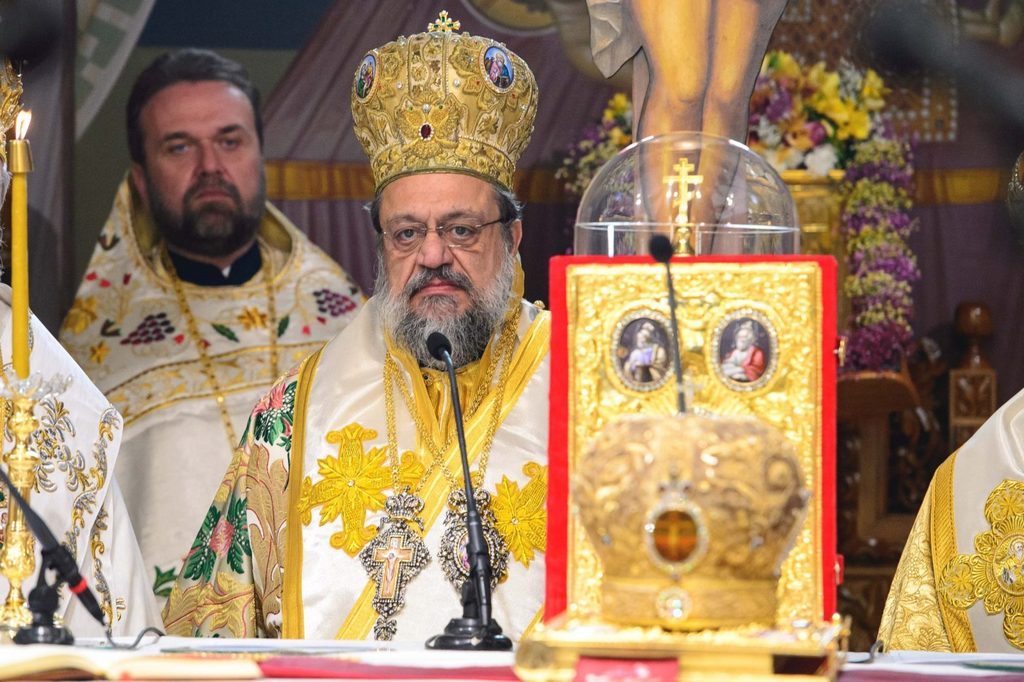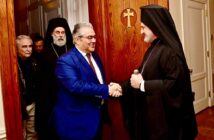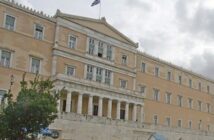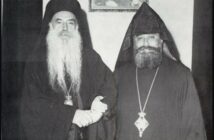Source: The National Herald

Metropolitan Chrysostomos of Messinia presides over the Holy Service of the Epitaphios. (Photo provided by the Metropolis of Messinia)
BOSTON – His Eminence Metropolitan Chrysostomos of Messinia, one of the most prominent and learned hierarchs of the Church of Greece and Orthodoxy in general, professor at the University of Athens, presented an interview to The National Herald. He spoke about the meaning of the Incarnation of God, violence, same-sex marriage, elderism and more.
The National Herald: Your Eminence, these are Holy Days, marking the incarnate presence of God among us. What does this mean today for the modern man?
Metropolitan Chrysostomos: First of all, the very fact of the Incarnation of the Son and Logos of God and His revelation within history and the world is a decisive event. You see, it preserves within the world’s history a time before and after Christ, meaning that Christ, becoming human, made a breakthrough in history, changed its course and direction. He provided a different perspective on this history and simultaneously gave a much different meaning than what human life and the purpose and destiny of human society had until then.

TNH: In what state does the passing of time leave the Church of Greece and Greek society in general?
Metropolitan Chrysostomos: Because the issues concerning the Church and the State in Greece are interconnected, cooperating, and one encompasses the other, I believe that the problems of the people must and are becoming the problems of the Church itself. The first significant element that Greek society is experiencing today is violence – domestic, social, – the violence that determines human relationships, and even the violation of nature when there is a growing tendency to question the family as a core of heterosexual relationships and not same-sex relationships, as some seek to impose. The Church, therefore, must and, I believe, does always impart that stamp rooted in Christian teaching, in the message of the Gospel, and which has been established, tested, and ingrained in the Tradition of the Fathers of the Church.
TNH: Having touched upon this topic, where do you think the proposed legalization of same-sex marriage will lead?
Metropolitan Chrysostomos: I believe that this will be legislatively established; it’s a matter of time. However, I think it brings significant disruptions to social cohesion, the unity of the world, and especially the Church will be compelled, in an official manner, as the body of the Hierarchy of the Church of Greece, to resist, expressing the true content of the Church’s teachings regarding the institution of the family, the role of parents in relation to children, and the relationship of children with their parents.
TNH: The new President of SYRIZA, Stefanos Kasselakis, is married to a man. What does this mean for the institution of the family as we have known and experienced it for centuries?
Metropolitan Chrysostomos: It is a bombshell to the foundations of Greek society, which is the family. This gentleman came to Greece through a party process, became the president of this party, and the way he presented himself in Greek society was a stance to lead and break existing taboos. The Church’s problem is not the taboo, but that at this moment, the institution of the family is being jeopardized, questioned, and dissolved.

TNH: How do you view the phenomenon of ‘Gerontism’ – ‘Elderism’ which has literally filled Greece with prophecies and futurology, processions of icons, relics, and objects, even chestnuts?
Metropolitan Chrysostomos: These are substitutes for a religion where genuine faith is lacking and is understood by all these as religiosity, magic. The concept of the community of relationships among people is missing, and it leads people to depend on a person, the ‘Elder’. This means that people, feeling insecure, seek supernatural protection in all these wanderings of a misguided fictional religion that is not the truth. And this is an issue that the Church must seriously address, because in the coming years, the Church will experience such expressions and manifestations that tend to replace it.
There is a need for catechesis of the people. We should rewrite a catechesis of the Church with a modern discourse and contemporary representation that people can read and understand what it means to believe in Christ and be a member of His Church.
TNH: What do you believe about the Omogenia (Greek-American Community) of America?
Metropolitan Chrysostomos: Europe today, after the Maastricht Treaty, has lost its identity; in Greece, we tend to lose this identity. We have not lost it yet precisely because of the harmonious coexistence, interaction, and collaboration of the State and the Church. The Omogenia is called upon to be the substantive ambassadors of Greece in the country where they live, to reveal and express the content of the Greek identity, not in the sense of nationalism but of patriotism.



